- Home
- Martin Cruz Smith
Havana Bay Page 2
Havana Bay Read online
Page 2
"Same thing," Arkady said.
The captain – and in his wake, Rufo – went on. "A week ago the embassy informed us that Pribluda was missing. We did not expect them to invite a senior investigator from the Moscow prosecutor's office. Perhaps a family member, nothing more."
Arkady had talked to Pribluda's son, who had refused to come to Havana. He managed a pizzeria, a major responsibility.
Rufo went on. "Fortunately, the captain says, the identification performed today before your eyes is simple and conclusive. The captain says that a key found in the effects was taken to the apartment of the missing man where it unlocked the door. From an examination of the body recovered from the bay, Dr. Blas estimates that it is a Caucasoid male approximately fifty to sixty years of age, one hundred sixty-five centimeters in height, ninety kilos in weight, in every regard the same as the missing man. Moreover, the dental chart of the Russian citizen Pribluda you yourself brought shows one lower molar filled. That molar in the recovered jaw is a steel tooth which, in the opinion of Dr. Blas, according to the captain, is typical Russian dental work. Do you agree?"
"From what I saw, yes."
"Dr. Blas says he finds no wounds or broken bones, no signs of violence or foul play. Your friend died of natural causes, perhaps a stroke or aneurysm or heart attack, it would be almost impossible to determine which for a body in this condition. The doctor hopes he did not suffer long."
"That's kind of him." Although the doctor appeared more smug than sympathetic.
"The captain, for his part, asks if you accept the observations of this autopsy?"
"I'd like to think about it."
"Well, you accept the conclusion that the body recovered is that of the Russian citizen Pribluda?"
Arkady turned to the examining table. What had been a bloated cadaver was now split and gutted. Of course, there had been no face or eyes to identify anyway, and finger bones never did yield prints, but someone had lived in that ruined body.
"I think an inner tube in the bay is a strange place to find a Russian citizen."
"The captain says they all think that."
"Then there will be an investigation?"
Rufo said, "It depends."
"On what?"
"On many factors."
"Such as?"
"The captain says your friend was a spy. What he was doing when he died was not innocent. The captain can predict your embassy will ask us to do nothing. We are the ones who could make an international incident of this, but frankly it is not worth the effort. We will investigate in our own time, in our own way, although in this Special Period the Cuban people cannot afford to waste resources on people who have revealed themselves to be our enemy. Now do you understand what I mean?" Rufo paused while Arcos took a second to compose himself. "The captain says an investigation depends on many factors. The position of our friends at the Russian embassy must be taken into account before premature steps are taken. The only issue we have here is an identification of a foreign national who has died on Cuban territory. Do you accept it is the Russian citizen Sergei Pribluda?"
"It could be," Arkady said.
Dr. Blas sighed, Luna took a deep breath and Detective Osorio weighed the keys in her palm. Arkady couldn't help feeling like a difficult actor. "It probably is, but I can't say conclusively that this body is Pribluda. There's no face, no prints and I doubt very much that you will be able to type the blood. All you have is a dental chart and one steel tooth. He could be another Russian. Or one of thousands of Cubans who went to Russia. Or a Cuban who had a tooth pulled by a Cuban dentist who trained in Russia. Probably you're right, but that's not enough. You opened Pribluda's door with a key. Did you look inside?"
Dr. Blas asked in precisely snipped Russian, "Did you bring any other identification from Moscow?"
"Just this. Pribluda sent it a month ago." Arkady dug out of his passport case a snapshot of three men standing on a beach and squinting at the camera. One man was so black he could have been carved from jet. He held up a glistening rainbow of a fish for the admiration of two whites, a shorter man with a compensating tower of steel-wool hair and, partially obscured by the others, Pribluda. Behind them was water, a tip of beach, palms.
Blas studied the photograph and read the scribble on the back. "Havana Yacht Club."
"There is such a yacht club?" Arkady asked.
"There was such a club before the Revolution," Blas said. "I think your friend was making a joke."
Rufo said, "Cubans love grandiose titles. A 'drinking society' can be friends in a bar."
"The others don't look Russian to me. You can make copies of the picture and circulate them."
The picture went around to Arcos, who put it back into Arkady's hands as if it were toxic. Rufo said, "The captain says your friend was a spy, that spies come to bad ends, as they deserve. This is typically Russian, pretending to help and then stabbing Cuba in the back. The Russian embassy sends out its spy and, when he's missing, asks us to find him. When we find him, you refuse to identify him. Instead of cooperating, you demand an investigation, as if you were still the master and Cuba was the puppet. Since that is no longer the case, you can take your picture back to Moscow. The whole world knows of the Russian betrayal of the Cuban people and, well, he says some more in that vein."
Arkady gathered as much. The captain looked ready to spit.
Rufo gave Arkady a push. "I think it's time to go."
Detective Osorio, who had been quietly following the conversation, suddenly revealed fluent Russian. "Was there a letter with the picture?"
"Only a postcard saying hello," Arkady said. "I threw it away."
"Idiota" Osorio said, which nobody bothered to translate.
"It's lucky you're going home, you don't have many friends here," Rufo said. "The embassy said to put you in an apartment until the plane."
They drove by three-story stone town houses transformed by the Revolution into a far more colorful backdrop of ruin and decay, marble colonnades refaced with whatever color was available – green, ultramarine, chartreuse. Not just ordinary green, either, but a vibrant spectrum: sea, lime, palm and verdigris. Houses were as blue as powdered turquoise, pools of water, peeling sky, the upper levels enlivened by balconies of ornate ironwork embellished by canary cages, florid roosters, hanging bicycles. Even dowdy Russian cars wore a wide variety of paint, and if their clothes were drab most of the people had the slow grace and color of big cats. They paused at tables offering guava paste, pastries, tubers and fruits. One girl shaving ices was streaked red and green with syrup, another girl sold sweetmeats from a cheesecloth tent. A locksmith rode a bicycle that powered a key grinder; he wore goggles for the sparks and shavings flying around him as he pedaled in place. The music of a radio hanging in the crook of a pushcart's umbrella floated in the air.
"Is this the way to the airport?" Arkady asked.
"The flight is tomorrow. Usually there's only one Aeroflot flight a week during the winter, so they don't want you to miss it." Rufo rolled the window down. "Phew, I smell worse than fish."
"Autopsies stay with you." Arkady had left his overcoat outside the operating theater and separated the coat now from the paper bag holding Pribluda's effects. "If Dr. Blas and Detective Osorio speak Russian, why were you along?"
"There was a time when it was forbidden to speak English. Now Russian is taboo. Anyway, the embassy wanted someone along when you were with the police, but someone not Russian. You know, I never knew anyone so unpopular so fast as you."
"That's a sort of distinction."
"But now you're here you should enjoy yourself. Would you like to see the city, go to a cafe, to the Havana Libre? It used to be the Hilton. They have a rooftop restaurant with a fantastic view. And they serve lobster. Only state restaurants are allowed to serve lobster, which are assets of the state."
"No, thanks." The idea of cracking open a lobster after an autopsy didn't sit quite right.
"Or a paladar, a private restaurant. T
hey're small, they're only allowed twelve chairs but the food is much superior. No?"
Perhaps Rufo didn't get a chance to dine out often, but Arkady didn't think he could even watch someone eat.
"No. The captain and sergeant were in green uniforms, the detective in gray and blue. Why was that?"
"She's police and they're from the Ministry of the Interior. We just call it Minint. Police are under Minint."
Arkady nodded; in Russia the militia was under the same ministry. "But Arcos and Luna don't usually go out on homicides?"
"I don't think so."
"Why was the captain going on about the Russian embassy?"
"He has a point. In the old days Russians acted like lords. Even now, for Cuban police to ask questions at the embassy takes a diplomatic note. Sometimes the embassy cooperates and sometimes it doesn't."
Most of the traffic was Russian Ladas and Moskviches spraying exhaust and then, waddling as ponderously as dinosaurs, American cars from before the Revolution. Rufo and Arkady got out at a two-story house decorated like a blue Egyptian tomb with scarabs, ankhs and lotuses carved in stucco. A car on blocks sat in residence on the porch.
"'57 Chevrolet." Rufo looked inside at the car's gutted interior, straightened and ran his hand over the flecked paint. From the back. "Tail fins." To the front bumper. "And tits."
From the car key in the bag of effects Arkady knew that Pribluda had a Lada. No breasts on a Russian car.
As they went in and climbed the stairs the door to the ground-floor apartment cracked open enough for a woman in a housedress to follow their progress.
"A concierge?" Arkady asked.
"A snoop. Don't worry, at night she watches television and doesn't hear a thing."
"I'm going back tonight."
"That's right." Rufo unlocked the upstairs door. "This is a protocol apartment the embassy uses for visiting dignitaries. Well, lesser dignitaries. I don't think we've had anyone here for a year."
"Is someone from the embassy coming to talk about Pribluda?"
"The only one who wants to talk about Pribluda is you. You like cigars?"
"I've never smoked a cigar."
"We'll talk about it later. I'll be back at midnight to take you to the plane. If you think the flight to Havana was long, wait till you go back to Moscow."
The apartment was furnished with a set of cream-and-gold dining chairs, a sideboard with a coffee service, a nubby sofa, red phone, a bookshelf with titles like La Amistad Russo-Cubana and Fidel y Arte supported by erotic bookends in mahogany. In a disconnected refrigerator a loaf of Bimbo Bread was spotted with mold. The air conditioner was dead and showed the carbon smudges of an electrical fire. Arkady thought he probably showed some carbon smudges of his own.
He stripped from his clothes and showered in a stall of tiles that poured water from every valve and washed the odor of the autopsy off his skin and from his hair. He dried himself on the scrap of towel provided and stretched out on the bed under his overcoat in the dark of the bedroom and listened to the voices and music that filtered from outside through the closed shutters of the window. He dreamed of floating among the playing fish of HavanaBay. He dreamed of flying back to Moscow and not landing, just circling in the night.
Russian planes did that, sometimes, if they were so old that their instruments failed. Although there could be other factors. If a pilot made a second landing approach he could be charged for the extra fuel expended, so he made only one, good or not. Or they were overloaded or underfueled.
He was both.
Circling sounded good.
Chapter Two
* * *
Osorio negotiated a white PNR Lada down a potholed street. Like her driving, she talked in a quick, surefooted way, deleting any s in the Russian language that she found superfluous. Since Arkady's Spanish consisted of gracias and par favor, he wasn't inclined to be critical even if she had appeared without warning in the early evening and gathered him in a rush.
She said, "You wanted to see your friend's apartment and so we will."
"That's all I asked."
"No, you asked much more. I think you are refusing to make an identification of your friend because you think you can force us to investigate."
"I assume you want to be sure you're sending the right body to Moscow."
"You think it's impossible for him to be out on the water the way we found him? Like a Cuban?"
"It does strike me as unusual."
"What I find unusual is that when a message comes to you from an embassy in Havana you drop everything to come. That's unusual. That must have been expensive."
The round-trip took half his savings. On the other hand, what was he saving for? Anyway, everything in Havana struck him as unusual, including the detective, although there was something about her small size and imperiousness he found endearing. Her features were delicate and sharply cut, dark eyes made darker with suspicion as if she were an apprentice devil handed a tricky soul. He also liked her sporty PNR cap with plastic visor.
"Tell me about this friend of yours," she demanded.
"You're interested?" He got no response to that. Oh well, he was fishing. "Sergei Sergeevich Pribluda. Workers' family from Sverdlovsk. Joined the Committee for State Security out of the army. Higher education at FrunzePartySchool. Stationed eight years at Vladimir, eighteen in Moscow, rising to colonel. Hero Worker, honored for bravery. Wife, dead ten years; one son, a manager in an American fast-food franchise in Moscow. I was unaware of Pribluda's ever being stationed abroad before or studying Spanish. Politically reactionary, a Party member. Interests, Central Army ice-hockey team. Health, vigorous. Hobby, gardening."
"Not drinking?"
"He made flavored vodka, that's part of gardening."
"Not culture, the arts?"
"Pribluda? Hardly."
"You worked together?"
"In a way. He tried to kill me. It was a complicated friendship." Arkady gave her the short version. "There was a murder in Moscow involving politics. As it happened, there was a woman who was a dissident that he suspected. Since I thought she was innocent, I became a suspect and Pribluda was given the job of delivering, as we say, a nine-gram letter in the back of my head. But we had spent time together by then, long enough for me to discover there was something strangely honest about him and for him to decide there was, as you say, something of the idiota about me. And when he was given the order to shoot me, he didn't. I don't know whether you could call it a friendship, but our relationship was built on that."
"He disobeyed an order? There's never an excuse for that."
"God knows. He liked to grow his own vegetables. When his wife died, I would go round to his place and drink his vodka and eat his cucumbers and he would remind me that not every guest got to dine with his executioner. Red tomato pickle, green tomato pickle, peppers and dark bread to eat. Lemongrass and buffalo grass to flavor the vodka."
"You said he was a Communist."
"A good Communist. He would have joined the Party coup if it hadn't been led, as he said, by imbeciles. Instead, he drank until it all blew over and then went into a decline. He said we weren't real Russians anymore, only eunuchs, that the last Russian, the last true Communist anywhere was Castro." Which Arkady had taken as drunken ranting at the time, a detail he decided not to share with Osorio. " He said he was looking for a post outside Moscow. I never knew he meant here."
"When was the last time you saw the colonel?"
"More than a year ago."
"But you were friends."
"My wife didn't like him."
"Why not?"
"An old score. Why would the captain turn down the picture of Pribluda and his friends?" Arkady asked.
"He must have his reasons," Osorio said in a tone that suggested she didn't fathom them either.
Jasmine lay like snow over walls, Dumpsters overflowed with the sweet stench of fruit skins.
Binding the ocean was what Osorio called the Malecón, a seawall that
protected a six-lane boulevard and an oceanfront line of three-story buildings. The sea was black, and traffic on the boulevard consisted of the running lights of cars a block apart. The buildings were the gaudy group Arkady had seen at daybreak from the other side of the bay; without their colors, dimly lit by lamps, they were occupied wrecks. In the shadow of a long arcade Osorio unlocked a street door and led him up worn stone stairs to a steel door which let them into a living room that could have been delivered complete from Moscow: subdued lamps, stereo, chess set, upholstery on the front door, lace curtains on the balcony doors. Homey Soviet hammer and sickle in silk tacked to a wall. A table and tray of water glasses, dish of salt. Whittled nostalgia – roosters, bears, St. Basil's – on the shelves. Plastic ivy and carnations trimming a kitchenette with a two-burner range, refrigerator, butane tanks.
Bottles of Havana Club rum and Stolichnaya stood under the sink.
The only element out of place was a black man in a white shirt with a red bandanna around his head and Reebok basketball shoes on his feet sitting in a corner chair and holding a long, straight walking stick. It took a moment without breathing for Arkady to realize that the figure was a man-sized effigy. The face had a crudely molded brow and nose, mouth and ears, making its glass eyes glitter all the more.
"What is that?"
"Chango."
"Chango?"
"A Santeria spirit."
"Right. And why would Pribluda have it?"
"I don't know. That's not what we came for," Osorio said. What they had come for, apparently, was to see how thoroughly she had dusted the apartment for fingerprints, every door, jamb, knob and pull. Some prints had been lifted, leaving the transfer tracks of tape. But many more prints were visible as brown whorls expertly brushed.
"You did all this?" he asked Osorio.
"Yes."
"Brown powder?" He hadn't seen that before.
"Cuban fingerprint powder. In this Special Period, imported powders are too expensive. We make powder from burned palm fronds."

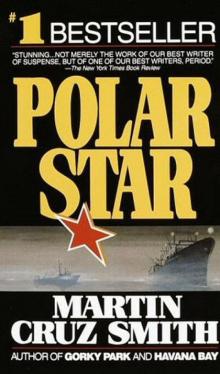 Polar Star
Polar Star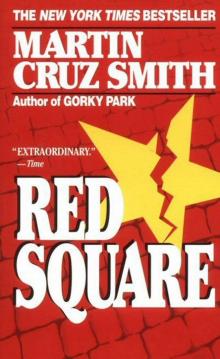 Red Square
Red Square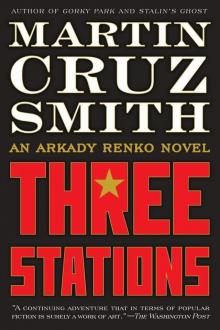 Three Stations
Three Stations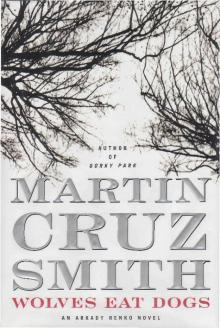 Wolves Eat Dogs
Wolves Eat Dogs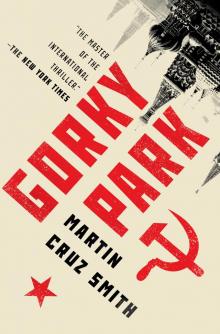 Gorky Park
Gorky Park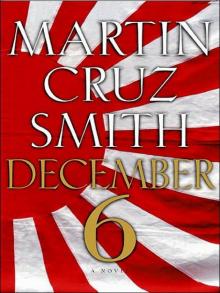 December 6
December 6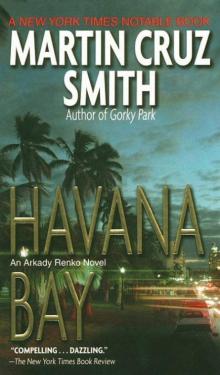 Havana Bay
Havana Bay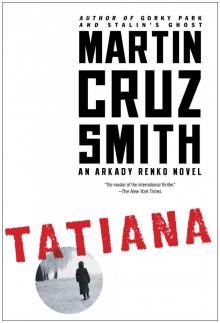 Tatiana
Tatiana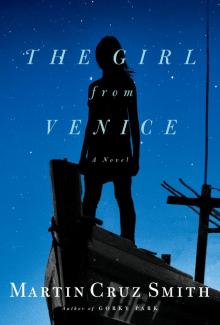 The Girl From Venice
The Girl From Venice Stalin's Ghost
Stalin's Ghost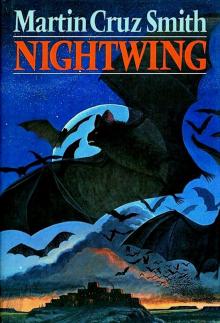 Nightwing
Nightwing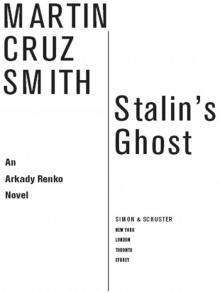 Stalin s Ghost
Stalin s Ghost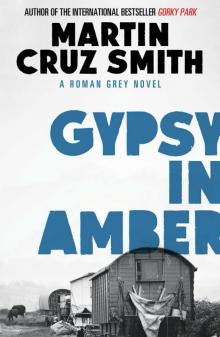 Gypsy in Amber
Gypsy in Amber Rose
Rose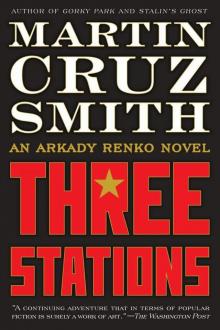 Three Stations: An Arkady Renko Novel
Three Stations: An Arkady Renko Novel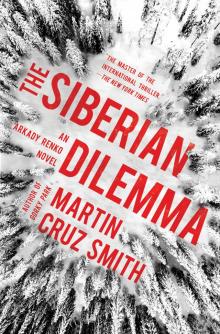 The Siberian Dilemma
The Siberian Dilemma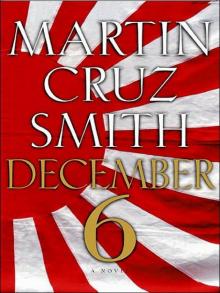 December 6 (V5.0)
December 6 (V5.0)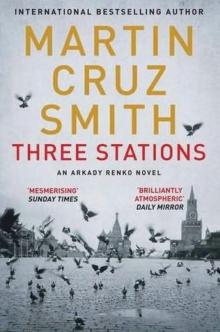 Three Stations ar-7
Three Stations ar-7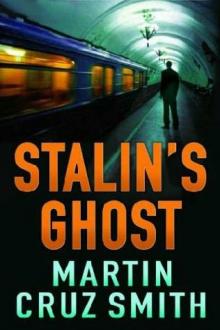 Stalin’s Ghost ar-6
Stalin’s Ghost ar-6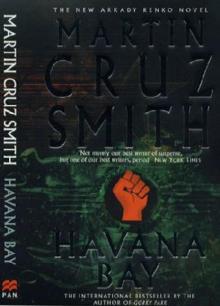 Havana Bay ar-4
Havana Bay ar-4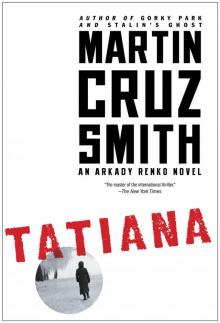 Tatiana ar-8
Tatiana ar-8